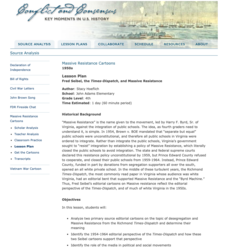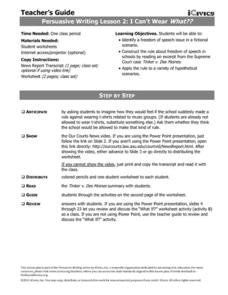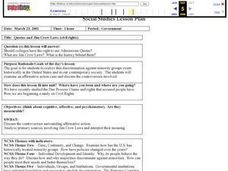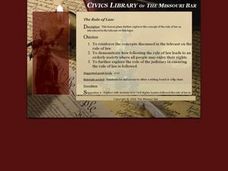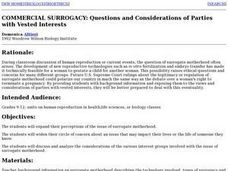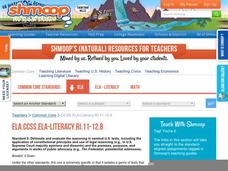ProCon
Obamacare
Former President Barack Obama reformed the United States' health care system with Obamacare, but is the new legislation good for America? Scholars read a historical timeline about the passage of health care reform laws and compare United...
Curated OER
Civil Rights Leader: Rosa Parks
All humans should have civil rights, but that wasn't the case in Alabama. This biographical presentation shares information about the life and inspiration that Rosa Parks brought to the Civil Rights movement. It explains her thoughts,...
Annenberg Foundation
Controversial Issues in Practice
Wow! This resource provides three related lessons on the First Amendment that challenge US government students to explore their personal opinion on the separation of church and state. Each lesson can be adjusted in length, but is...
Roy Rosenzweig Center for History and New Media
Fred Seibel, the Times-Dispatch, and Massive Resistance
A lesson challenges scholars to analyze editorial cartoons created by Fred Seibel, illustrator for the Times-Dispatch, during the Massive Resistance. A class discussion looking at today's editorial pages and Jim Crow Laws leads the...
iCivics
I Can’t Wear What?
Can schools ban t-shirts picturing musical groups or bands? Your young citizens will find out with this resource, which includes a summary of a United States Supreme Court case from the 1960s about a similar dispute over students wearing...
My Access
“Banning Books” Lesson Plan
To Kill a Mockingbird, Hunger Games, Brave New World. Welcome to Banned Books Week. As part of a study of censorship and book banning, class members investigate censorship, the purposes of censorship, and First Amendment rights,...
National First Ladies' Library
"Lockwood for President!" Belva Ann, Who?
Students examine the life of Belva Ann Lockwood. They see her life through the creation of a set of "news" articles on her admission to practice law before the Supreme Court in 1879 and her nomination for the presidency in 1884.
Curated OER
Ethnicity, Gender and the Courts
Eleventh graders explore their own beliefs about the qualities that make someone qualified to sit on the Supreme Court. In this American Government lesson, 11th graders write about and debate the ethnic, religious, and gender...
Curated OER
A Look At The Current Court
Pupils examine the characteristics of Supreme Court Justices. Using the interent, they research current effects effecting the Court. They complete a worksheet after examine the biographies of the justices. As a class, they discuss the...
Curated OER
The Law in the North And South As It Relates To Business From the 1900's To the 1990's
Students study how laws are different in other states and how some of the laws are the same. They examine the steps that must be taken to get a divorce in Connecticut, North Carolina, and South Carolina. They take a look at the laws...
Curated OER
Our Country's People, Lesson Two
In this US government worksheet, middle schoolers answer 8 multiple choice questions about the laws, courts, and Constitution of the United States.
Curated OER
The Development of Antitrust Enforcement
High schoolers analyze antitrust enforcement. In this American economics lesson plan, students listen to their instructor present a lecture regarding the details of the free market system and antitrust laws. High schoolers respond to...
Curated OER
Quotas and Jim Crow Laws
Students examine the use of quotas and Jim Crow laws. They discuss discrimination against minority groups both historically and in contemporary society. Students examine an affirmative action case and discuss the controversies involved.
Curated OER
the Impact of the U.s. Supreme Court on High School Journalism.
Students study of the First Amendment, Tinker, Hazelwood and the Colorado Student Free Expression Law. They discuss the ramifications on the student press and recite their memorized First Amendment rights. They discover what can...
Curated OER
Civics: The Rule of Law
Students examine key concepts pertaining to the rule of law. They explore how Civil Rights leaders such as Martin Luther King, Jr. used it to oppose discrimination practices. They examine Supreme Court decisions demonstrating the...
Curated OER
Washington, D.C.
In this Washington, D.C. government facts learning exercise, students read ten facts associated with the United States and determine if they are true or false.
Curated OER
Michigan Supreme Court
Learners read articles on a hot topic (controverial topic) and prepare for a discussion on the article. They engage in forming an opinion on an important public concern and defending their opinion/position with supporting data. They...
Curated OER
Should Homosexuals Have the Right to Laws Protecting Them From Discrimination?
Students research and write about homosexuals and how they are discriminated. They also participate in a mock U.S. Supreme Court trial.
Heritage Foundation
The Amendment Process and the Bill of Rights
Did you know that lawmakers have proposed more than 5,000 bills to amend the US Constitution in Congress? Your class learns intriguing facts about the process of choosing amendments. A variety of activities including before and after...
Heritage Foundation
Procedural Amendments: Amendments III, IV, and V
So many US Constitution clauses, so little time. The 17th installment in a 20-part series teaches pupils about the Third, Fourth, and Fifth Amendments. Learning through activities such as group work, connecting to current events, and...
Curated OER
The Judicial Branch
In this social studies instructional activity, students investigate the job of Sandra Day O'Connor in the judicial branch of the U.S. government. Students answer 25 questions, completing sentences with words from the word bank. This page...
Curated OER
Roe v. Wade: A History of Controversy
Young scholars research what is legal now as far as abortions are concerned. Does it matter what state you live in? Does it matter how old you are? If you are a teen, does the doctor have to notify your parents? Students prepare a panel...
Curated OER
Commercial Surrogacy: Questions & Considerations of Parties with Vested Interests
Teenagers explore the topic of surrogate motherhood. They examine the technology involved, types of surrogacy, interested groups, and current laws. Each collaborative group is assigned an interest group. They work together to develop...
Shmoop
ELA.CCSS.ELA-Literacy.RI.11-12.8
It is no easy feat to wade through legal and political documents. And incorporating this type of informational text into a literature class can also be a challenge. Here’s a resource that includes suggestions for how to address this...



